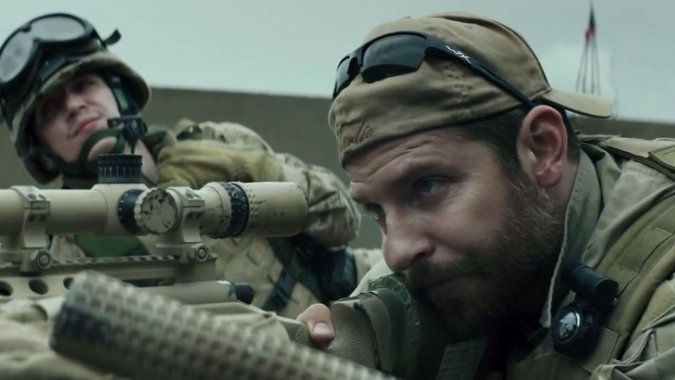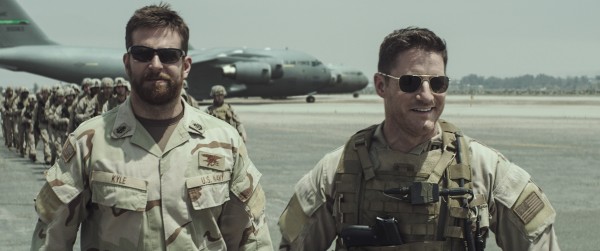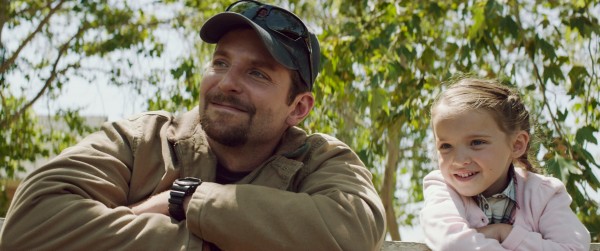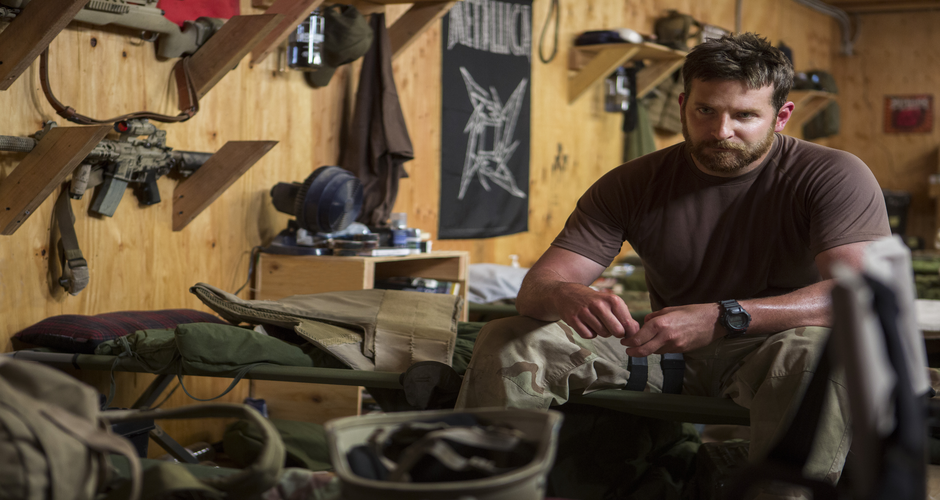A biopic is a tricky thing to make, especially when portraying a cultural icon or American hero. Directors have to walk a tightrope, making sure they are respectful towards their subject while also not shying away from their darker characteristics. This is easier to do when your main character has been dead for twenty years or so. You don’t have to worry so much about offending their family, friends, or co-workers. When your main character has been dead for less than two years, like American Sniper’s Chris Kyle, it’s much more difficult to take a ‘warts and all’ approach when telling their life story. Clint Eastwood and Bradley Cooper reportedly met with Kyle’s father and promised him that their movie would be respectful towards his son’s memory. They kept their promise. The result however, is an expertly made and sometimes terrifically suspenseful film that never bothers getting inside Chris Kyle’s head except in broad strokes. The movie hints at the emotional toll on his psyche but in a manner we’ve seen in a dozen other war movies. Kyle has 160 confirmed kills and watched many of his friends die. Surely that affected him in a more profound manner than making him stoic and occasionally violent towards dogs. Or maybe it didn’t. Maybe he really was able to separate himself from the people he shot and only the realization that he could not protect all his fellow soldiers was what kept him awake at night. I don’t know, but guess what? The movie doesn’t either.
The film’s opening scene is terrific; tense and engaging. Cooper is perched on a rooftop, watching the action on the ground with his scope. He spots a young boy and woman as they walk down the street and approach a group of marines. The woman hands the boy a grenade. Cooper reports this and is told by his superior that the shot is ‘his call’. He aims his weapon at the boy, flinches a bit, begins to squeeze the trigger…and then the camera jump cuts to him shooting a deer as a child. “What?” and “Why?” were the first two questions to shoot through my brain. This jump takes us right out of the action and plunges us into a cliched, banal, origin story that the movie doesn’t need. His father marvels at his son’s kill and remarks, “you’ve got a gift son”. This is the exact same dialogue that occurs in the first five minutes of Kingpin, except the father is referring to bowling instead of hunting. Heavy handed foreshadowing is fine in Kingpin because it’s a goddamn 20 year old spoof but American Sniper is supposed to be a serious drama. Dialogue like that does not belong.
Things get worse when Cooper grows up (minutes later) to be a young cowboy. His girlfriend cheats on him and he sits in his house with his brother wondering what he should do with his life. Well, wouldn’t you know it, mere seconds after he starts searching for a purpose, a news story concerning some bombings overseas appears on his TV. He stands up, pufts out his chest, and even though he doesn’t say, “I’m gonna be a solider”, he may as well have. This is one of the pitfalls of many a biopic: conveying long gestating life decisions by reducing them into a three minute scene that’s supposed to make us say, “oh so that’s why he joined the army.” It’s lazy storytelling and what’s worse is the fact that American Sniper doesn’t even need it. We accepted him as a trained solider from the first scene and the ham-fisted backstory tells us nothing we couldn’t have already guessed.

Thankfully, we’re soon back up on the rooftop and finally get to see (after an annoying recap) whether or not he pulled the trigger on that little kid. Things pick up from here and all of the film’s sniper scenes are suspenseful and thrilling. They’re also jarring because Eastwood takes care to show the great distance between Kyle and his victims. There’s nothing savage about what he does. People appear in his scope, he pulls a trigger, and then they fall to the ground. The simple but detached brutality of it is well-relected. Though I did wonder about the physical toll it took on Kyle. I can’t be easy to lie on a rooftop all day and look for targets. At the very least, your shoulder must ache after awhile. It never seems very difficult though because the scenes go by so quick. We also never get any insight into how Kyle became such a skilled sniper other than that dopey hunting scene and some half-baked advice he gets in bootcamp. “Aim small, miss small”, his Sgt. tells him and presto, he’s suddenly the greatest shot in the world. I’m not saying I needed the film to be an instruction manual on how to operate a high powered rifle but I would have appreciated it if the characters, who are professional soldiers, were allowed to speak about what they do like professional soldiers and not have to resort to little nuggets of wisdom so that the general public gets the gist of what they’re saying.
Still, the sniper scenes have a real life feel and a strong sense of immediacy to them that the stateside scenes lack. Kyle meets his wife (Sienna Miller) and their relationship consists of the usual trials and tribulations of every couple in every war movie. She misses him, he’s distant when he’s home, she wants him to stay, he wants to go back, she asks him what’s bothering him, he grunts and says, “nuttin”. This dilutes his problems to standard war movie cliches, almost checking them off like they’re displayed on a chart. And I can’t help but think this is at least partly because his story is such a recent one. Eastwood was far too concerned with being respectful to actually dig deep and find something to say about Chris Kyle at all. Other than his status as ‘deadliest sniper in U.S. history’ and ‘the legend’ to his pals, he isn’t portrayed as a very complex or even particularly interesting protagonist. When Eastwood does decide to show Kyle suffering from PTSD, he does so in the most obvious ways possible, highlighted by a clumsy scene at a barbecue where Kyle almost kills the family dog after it starts being a bit rough with his son. Again, this reduces complex mental problems to a three minute scene that’s supposed to make us say, “oh see, he is troubled.”

Troubled by what though? That he’s killed so many people or that he’s failed to save so many? American Sniper suggests both but never comes down on either side. If the latter is the answer, that’s a problem because we never get to know any of Kyle’s fellow soldiers. His enlisted brother is barely mentioned and I could only remember his three main war buddies by referring to them as ‘Black Guy’, ‘Guy with Mustache’, and ‘Other Guy’. They’re not characters at all, just stock friends for Kyle to mourn over or briefly bond with. Christ, one of em even gets shot seconds after talking about the ring he bought for his girlfriend. I though we effectively buried that cliché years ago. Did Eastwood not get the memo? Maybe he was just so concerned with portraying Kyle as this noble hero that he thought the cliches wouldn’t bother us. How else to account for the scene where Miller calls to tell him they’re having a baby boy only for a firefight to break out in the midst of their conversation? If that happened in real life, I’m a monkey’s uncle.
This is another frustrating element of biopics. People can always tell when you’ve changed details to make things ‘more exciting’. The story of the deadliest sniper in U.S. history would have been exciting enough without the cliches and they only serve to pull us right out of the movie. Come to think of it, I wonder if American Sniper even needed the standard biopic structure. Perhaps a more powerful way to tell the story would have been to just film one day in the life of Chris Kyle. Stay with him on that rooftop from dawn till dusk, show us how emotionally and physically taxing his job is, let him get a quick break to call home, then send him back to the roof. You know, let us really see what his job is like. I think it would have been a tighter portrait of the man and one that would be able to be respectful while also showing us all the horrors he committed and went through. If you paint your story on a smaller canvas, it may provoke a more powerful response from your audience.

Cuz you see, Kyle’s story is a sad one. And this is not a fucking spoiler by the way. There are no goddamned spoilers for true stories. After finally adjusting to home life and using much of his free time to help wounded veterans, he was shot and killed by a disturbed man he was trying to help. His death was a terrible tragedy and one that the movie doesn’t know how to build up to. It omits the actual scene of Kyle being killed (cuz that would be disrespectful) but it does show footage of his motorcade and funeral. I have to admit, I got choked up while watching the footage but that has less to do with the movie and more to do with how sad the real story is. This ending though, is slightly manipulative and only serves to highlight that the flick has nothing to say beyond, “he was a great guy, but man what a fucked up way for him to die.” You leave the theater in a state of bewilderment, unsure of how you’re supposed to feel or what you were supposed to take away.
And that’s because everybody involved was way too concerned with being respectful. Maybe they should have waited another ten or fifteen years to tell this story, when hindsight would provide more context and there would be less of an obligation to not piss anybody off. American Sniper is a perfectly competent movie, well acted by Cooper and Miller, and well directed by Eastwood but it plays more like a flowery tribute to a flawless hero than like a portrait of a real human being forever damaged by the horrors of war. It takes no risks, makes no statements, and offers no new insights. In other words, it’s a typical candidate for Best Picture.


GET CHOMPED